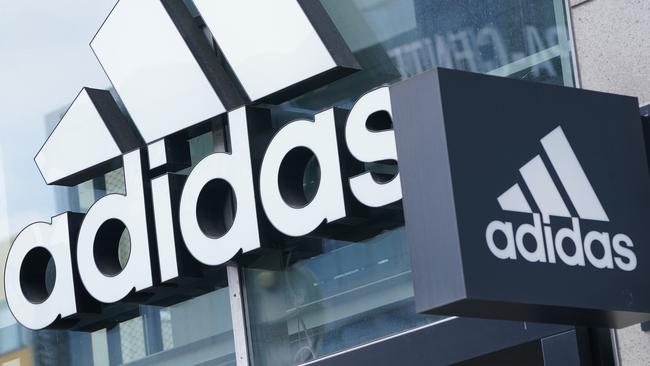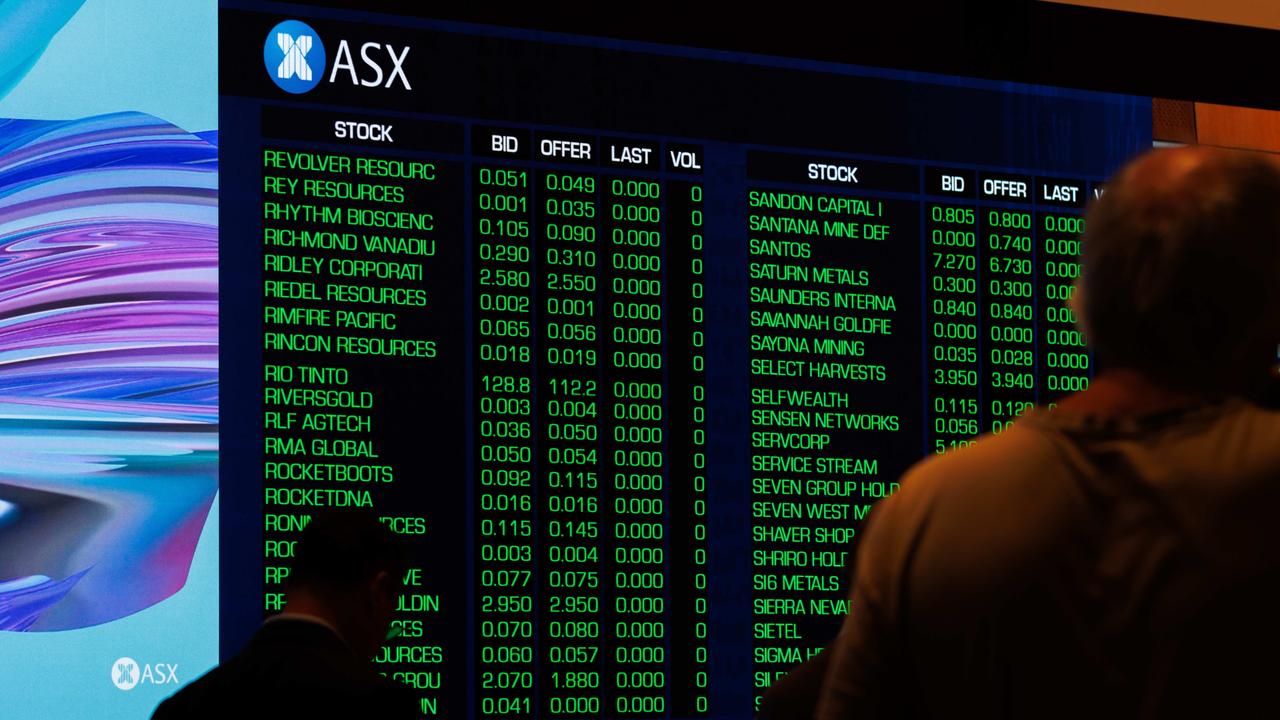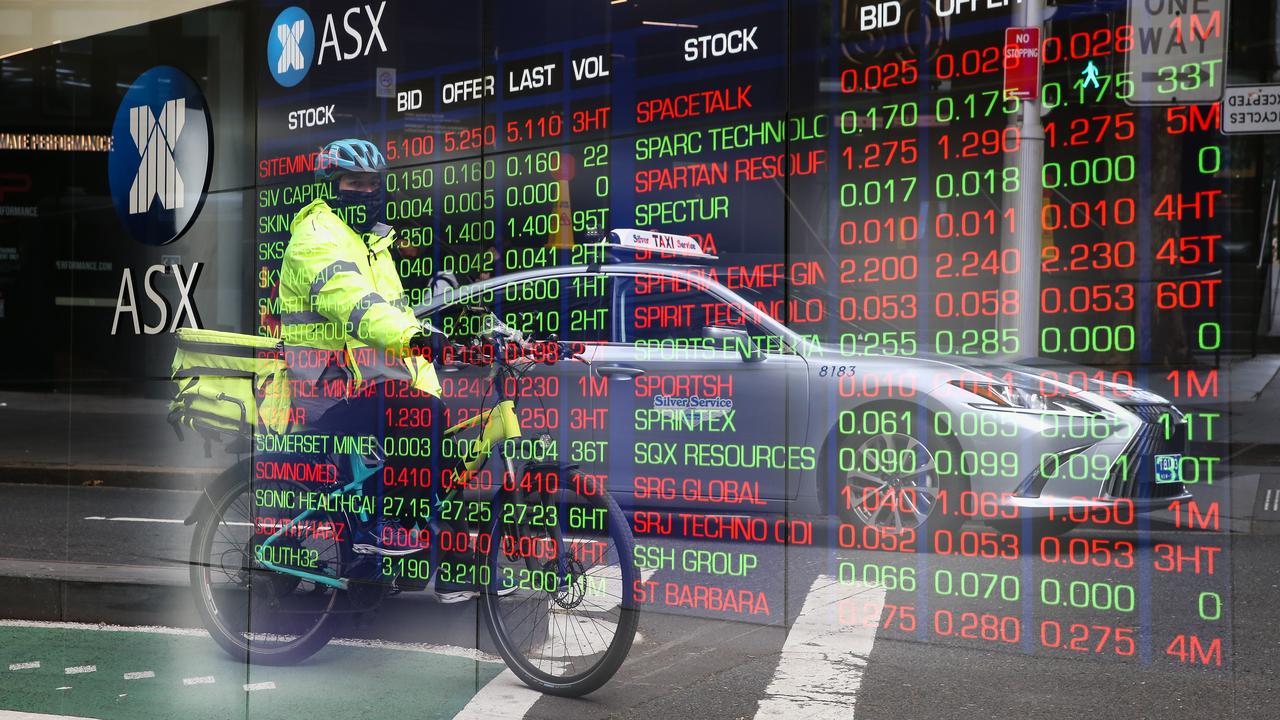Shares fade as US oil prices nosedive again
The ASX hit 6-day highs but finished slightly lower on a fresh oil hit, while retail and tech stocks cheered moves to restart the economy.
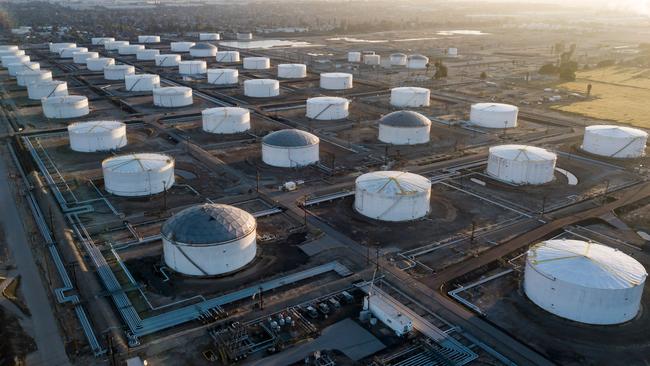
- Westpac warns of $2.2bn impairment
- Target, Kmart sales dropping off
- Lendlease halted for capital raise
- NAB slips on return after in-demand placement
That’s it for the Trading Day blog for Tuesday, April 28. The ASX faded from a six-day high to close lower by 8 points, after US oil prices fell below $11 in the Asian session.
That’s after a Wall Street lift overnight on optimism about steps to reopen the economy. The Dow and S&P 500 both gained 1.5 per cent, while the Nasdaq advanced 1.1 per cent.
Locally, banks remain in focus as NAB completed its $3bn placement, while Westpac warned of $2.2bn in impairments in the first half .
4.53pm: Banks in focus for credit estimates
Locally, and overseas, banks were firmly in focus as they assess their credit levels for a likely hit as economic activity stalls.
RBC Capital Market head of equities Karen Jorritsma points out the theme is prominent across all global markets.
“US banks results recently saw huge impairments being taken as they prepare their balance sheets for consumer credit pain and we have seen the same coming out of the region today with HSBC printing $3bn in credit losses during their 1Q result,” she writes.
Locally, Westpac warned of a $2.2bn impairment charge to come at its first half results but despite that, its shares rebounded by 1.8 per cent to $14.92 after a drop in Monday’s trade amid suggestions the bank would “absorb” the costs and not raise any further capital.
NAB was the biggest drag, slipping by 2.8 per cent to $15.32 on its return to trade after raising $3bn in an institutional placement.
Commonwealth Bank edged lower by 0.5 per cent to $58.61 while ANZ put on 0.3 per cent to $15.70 ahead of its results to be released on Thursday.
Here’s the biggest movers at the close:
4.11pm: Shares edge lower on energy hit
At its worst the local market was down by 1pc, at its best it was up by the same margin, but renewed oil weakness ultimately sent the market to a flat close.
Shares had a strong lead from the US on positivity of steps to restart the economy, and helped further by the easing of some restrictions on a state-by-state basis locally.
Still, underlying oil price weakness served a blow to the market’s progress – pulling the ASX to close down 8 points or 0.16 per cent at 5313.1.
Meanwhile, the All Ords lost 7 points or 0.13 per cent to 5381.2.
Eli Greenblat 3.45pm: Woolworths lifts limits, not for TP
Woolworths has joined with Coles to allow some relief on buying limits imposed by panic buying through March and April that saw shoppers strip the shelves of toilet paper, rice, pasta, hand sanitiser and other grocery essentials, however for now Woolworths will keep some limits on toilet paper.
Coles became the first supermarket to act today when it decided to lift completely the buying limits on toilet paper while keeping some limits on 10 other grocery products.
Woolworths announced this afternoon that toilet paper and rice were moving from a limit of one product per shop to 4 per shop.
All product limits have been removed for pasta, frozen vegetables, tissues, baby wipes, baked beans and canned spaghetti, paper towels and disposable gloves.
There would be a two limit per shop remains for eggs, flour, sugar, pasta sauce, handwash, cleaners and disinfectants.
From tomorrow, Woolworths will be easing product limits on toilet paper, rice, hand sanitiser and antibacterial wipes with customer demand moderating and supply returning.
3.37pm: Tech, discretionary buoyed on restart hopes
Tech and consumer discretionary stocks are the only in the green in afternoon trade – buoyed by hopes of an economic restart.
In the final hour of trade, consumer discretionary stocks are higher by 1.1pc while tech stocks are up by 0.9pc.
Temple and Webster is a key outperformer, up 8.8pc to $3.72 on a positive trading update while Afterpay is higher by 2.1 per cent to $28.33.
Read more: Coronavirus lockdowns suit Temple & Webster
3.29pm: UBS increases credit loss expenses
UBS Group AG’s first-quarter net profit rose 40pc as the Swiss bank joined US and European peers in preparing for loan losses.
Credit loss expenses rose to $268m from $20m for the same period last year. Of this, $122m was in the investment bank business and $53m in its key wealth management business.
The performance of UBS’s investment bank operations, as well as its wealth management and asset management businesses, supported the results.
Net profit for the period was $1.60 billion compared with $1.14 billion a year earlier, the Swiss bank said Tuesday.
UBS said earlier in April it expected a net profit for the period of around $1.5 billion.
Dow Jones Newswires
2.45pm: Westpac won’t raise capital: Morgans
Westpac’s announcement this morning of a $2.2bn impairment charge in the first half is slightly lower than expectations and aligns with a base case that the bank won’t raise further capital, according to Morgans.
The broker notes that Westpac’s interim divided decision will be deferred and makes an observation that the provisions from the bank make NAB’s announcement yesterday look light.
“Consequently, we see increased risk of provision top-ups for NAB; however, we have such top-ups already factored into our forecasts and valuation for NAB,” analyst led by Azib Khan write.
He adds that the lower than tipped impairment charge has increased its FY20 cash EPS forecasts by 1.9pc.
He retains an add rating on the stock, with a price target of $19.50.
2.32pm: HSBC results a significant miss
Australia’s S&P/ASX 200 shares index extended its intraday fall to 0.9pc as HSBC results significantly missed expectations.
The index has seen a significant reversal of intraday strength after initially rising 1pc to a 6-day high of 5373.8.
The world’s 7th biggest bank reported a first quarter pre-tax profit of $US3.04bn vs $4.37bn expected according to Bloomberg. It came as HSBC estimated credit losses of $US3bn for the quarter.
Whether that’s enough to rock global markets remains to be seen but S&P 500 futures are down 0.6pc.
Add to that the sustained downward pressure on oil prices and perhaps the optimism about economic reopening will be offset.
Eli Greenblat 2.26pm: Coles lifts toilet paper limits
After panic buying through March and April that saw customer strip products from the shelves of supermarket retailers and triggered a restriction on buying limits, Coles has decided to lift the purchasing limit on toilet paper.
“We are pleased to be able to remove purchase limits at Coles on key household staples like toilet paper and paper towel, and expect to remove further limits as customer demand continues to stabilise and more categories see supply levels return to normal,’’ a Coles spokesman said.
This week The Australian reported that Coles was set to lift the buying limits on toilet paper.
“We are grateful for the efforts of our suppliers to deliver significantly increased volumes to meet the recent unexpected surge in customer demand, and to our customers for their patience and understanding as our store and supply chain team members worked to get as much stock onto shelves as possible,’’ a Coles spokesman said.
Now just 10 items have purchasing limits at Coles:
- Pasta
- Flour
- Dry rice
- Eggs
- Frozen vegetables
- Frozen desserts
- Sugar
- Tin tomatoes
- Liquid soap
- Anti-bacterial wipes
COL last traded down 0.1pc at $16.20.
Read more: Coles lifts toilet paper restrictions
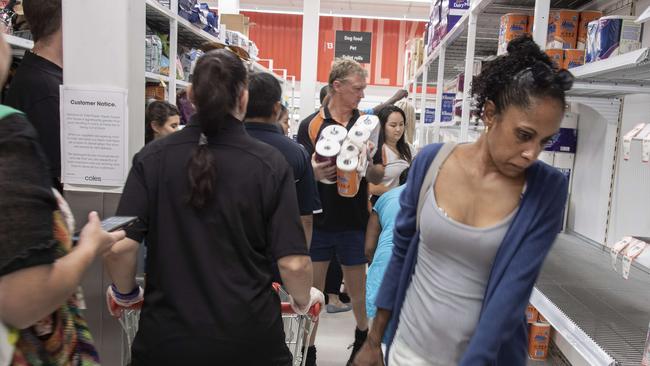
Nick Evans 2.12pm: Saracen smashes production targets
Gold miner Saracen has beaten its March quarter production guidance, despite restrictions imposed to limit the impact of the coronavirus, saying on Tuesday it had posted record production from its Australian mines.
Saracen produced 158,132oz from its Australian operations in the period, at an average all-in-sustaining cost of $1133/oz.
The company said its gold sales generated $369m in revenue in the period, and posted an unaudited net profit after tax of $65 to $70m for the period.
SAR last traded down 1.8pc to $4.48 as the broader gold sector takes a hit.
Read more: Saracen sets production record
1.57pm: Shares sink to daily lows
The local share slip has extended to 0.6pc in afternoon trading as energy stocks fall by 1.5pc.
Just before 2pm, the ASX is trading at 5290.7, its lowest levels of the day.
That’s as Santo trades down by 2.3pc while Woodside and Oil Search are off by 1.4pc and 1.9pc respectively.
Perry Williams 1.49pm: Coronado slashes spending by 40pc
Miner Coronado Global Resources has withdrawn its annual earnings guidance and slashed spending by 40 per cent as COVID-19 causes uncertain demand and pricing for metallurgical coal.
The producer said a planned expansion of its Curragh coal mine in Queensland, one of the world’s largest met coal mines, has been deferred as part of the spending reduction. It had previously guided for $190m-$210m of capex in the 2020 financial year.
Coronado said its revenue fell 8 per cent to $US409m in the March quarter on lower metallurgical coal prices.
The coal price fell from $US147 a tonne in January to $US141 a tonne in late March and has since fallen to $US122 a tonne with further falls likely, the company said.
Global steel producers outside of China have cut production due to a decline in demand from the construction and automotive industries including Japan, South Korea, Brazil, Europe and North America.
“These regions have enforced steel production cuts between 30-60 per cent. The timing of a global recovery is uncertain given the economic backdrop and the potential for further downside risks to the price of metallurgical coal is high.”
Coking coalminers are bracing for the delay or cancellation of shipments as Australia’s biggest customers idle blast furnaces and cut steel production due to the coronavirus crisis, with Stanmore Coal on Monday cutting its earnings guidance on the back of deferred deliveries.
Coronado’s net debt rose to $US437m at March 31 from $303m at December 31 with the company holding a $550m syndicated facility.
CRN shares last up 3.1pc to $1.25.
1.37pm: Charter Hall slips after placement
Charter Hall Retail REIT is one of the worst performers on the top 200, after completing its $275m placement and returning to trade.
At 1.30pm, shares in the property group are lower by 4.9pc to $2.99 – still above its placement offer price of $2.90 apiece.
Citi analyst Adrian Dark notes that the placement was offered at a “quite unfavourable” discount of 30pc against its pre-raising net tangible assets.
“The raising price represents an 11pc EPS/10pc DPS yield based on pre-virus estimates. This appears to be well above achievable yields on acquisitions/developments, highlighting that the placement is defensive in nature,” he writes, adding that he was surprised asset sales were not considered as a more viable option.
Still, he upgrades the stock to Neutral on valuation, but says “we believe the raising highlights income and asset value headwinds for retail landlords, and strongly supports our long-held preference for non-retail exposures”.
Read more: Coronavirus crisis spurs a rush to raise capital
Bridget Carter 1.29pm: Will Scentre follow Lendlease to raise?
DataRoom | After the $1.15bn equity raising by Lendlease announced on Tuesday, many are now turning their attention back to Scentre Group which they believe is the next most obvious candidate for a cash call to investors in the real estate space.
Lendlease announced it was selling shares at $9.80 each, an 8.2 per cent discount to their last closing price of $10.68, to strengthen its balance sheet, as it wrestles with work stoppages at its construction sites overseas due to COVID-19 restrictions.
Morgan Stanley, Goldman Sachs and UBS are working on the deal and it comes after DataRoom reported this month that banks had been sounding out the market about an equity raising for Lendlease worth about $1bn.
With Lendlease raising alongside shopping centre landlords SCA Property Group and Charter Hall Retail REIT, which are most strongly positioned with much of their revenue coming from supermarkets, experts believe that Westfield shopping centre owner Scentre Group will need to tap the market because of its debt level of almost 35 per cent.
The thinking is that listed mall owners are hesitant to do so while trying to stare down their tenants amid rent negotiations for the COVID-19 disruptions.
1.22pm: Supermarket profit upgrades unlikely: UBS
A boost in supermarket sales is unlikely to translate to profit upgrades for the major listed chains, but should continue into the June quarter, according to analysts at UBS.
The broker upgrades its March quarter supermarket sales estimates to a 14pc year-on-year jump, and 9pc for the June quarter.
Still, analysts led by Ben Gilbert note profit upgrades are unlikely.
“We believe that operating leverage, particularly in Q3 FY20 will be significantly lower than history; reflecting a material step-up in operating costs, namely in-store labour (UBSe ~doubled) and logistics,” Mr Gilbert writes.
“This, in our view will see management temper expectations around material lifts incremental margin at the Q3 updates.”
He says Woolworths is the firm’s preferred exposure as it is set to benefit in the medium term from its online and data capabilities.
Coles is due to update the market tomorrow, and Woolworths on Thursday.
1.02pm: Shares fight to hold gains
Local shares are fighting to hold to gains at lunch time, giving up as much as 1pc rally as US oil prices fall below $US11.
At 1pm, the ASX200 is trading flat at 5321.2 with mixed trade across sectors.
Tech and consumer discretionary stocks are outperforming on early signals of reopening while energy sheds 1pc and NAB is still down by 2.4pc.
Here’s the biggest movers at lunch:
12.52pm: Equity raisings profitable so far: Macq
Macquarie Equities expects the capital raisings to keep coming, saying the good news was that the vast majority of them have been worth participating in.
The broker’s Australian equity strategist Matthew Brooks counts 35 announced capital raisings over $25m between March 18 and April 27, with a total value of $15.4bn.
Of those conducted before April 24, the average return for raisings was 17pc with 74pc of these being profitable. That compares with a smaller rise in the ASX 300 of just 6pc in the same period.
Mr Brooks notes that deals with higher discounts tend to have higher returns, as do “supersize” deals – partly due to higher discounts, though their “hit rate” is slightly below average.
Deals where the main purpose is investment or M&A have above average returns, as do “upsized” deals where the placement is increased, with a slightly higher hit rate.
He still expects more ASX equity raisings given the high level of earnings uncertainty since more than 33pc of ASX 300 companies have withdrawn their earnings guidance.
Indeed, the total value of the capital raisings conducted since the COVID-19 crisis is still only about 15pc of the $100bn raised in the GFC.
Read more: Crisis spurs a rush to raise capital
12.41pm: US oil nosedives below $11
US oil nosedived below $11 a barrel Tuesday after a major exchange-traded fund started selling its short-term contracts of the commodity, and storage concerns mounted as the coronavirus strangles demand.
West Texas Intermediate, the American benchmark, for June delivery dropped 14.8 per cent to $10.88 a barrel in Asian morning trade – a day after plunging 25 per cent.
International benchmark Brent crude slipped 4.4 per cent to trade at $19.10 a barrel.
Prices have plunged in recent weeks as demand for the commodity collapses owing to lockdowns and travel restrictions imposed worldwide to fight the virus.
AFP
Eli Greenblat 12.01pm: Let national cabinet tackle economy: Scott
Wesfarmers chief executive Rob Scott is calling for the national cabinet that has been instrumental in bringing together federal and state government leaders to tackle the coronavirus pandemic to be preserved once the health crisis is over and be repurposed to solve Australia’s looming economic crisis.
Mr Scott told The Australian that the national cabinet formed with the intention of bringing clarity and decision making to the coronavirus issue had proven its worth and would be well equipped to take a leadership role in repairing the nation’s economy as well as implementing crucial economic reform.
“Although the future is uncertain it is likely we we'll see much higher unemployment, lower economic growth and we are probably about to embark on the most challenging period economically that Australia has in 30 or 40 years,’’ Mr Scott told The Australian.
“So that in itself provides a catalyst for us to consider reform options and I think there is a really important role for the national cabinet which has been a really effective way of bringing state and federal leaders together to make key decisions on a timely basis.”
Read more: Bunnings bonanza not shared across Wesfarmers
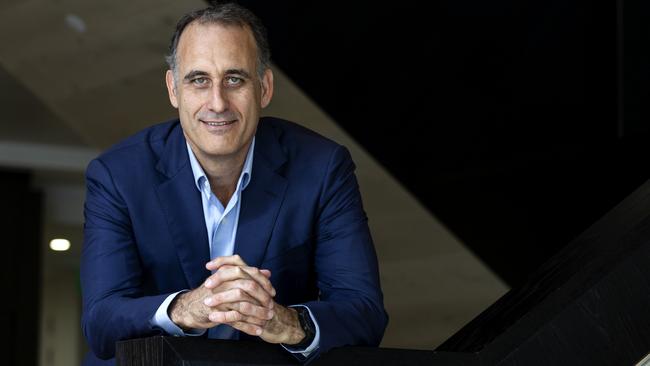
11.50am: ASX erases 1pc gain
The Australian sharemarket remains volatile, rapidly erasing a 1pc intraday rise as S&P 500 futures fell 0.3pc.
It came as June WTI crude oil futures dived 14pc to $11 a barrel.
WTI futures fell 25pc overnight after the US Oil Fund Oil ETF said it would roll its oil futures holdings further along the curve.
Interestingly, Bloomberg’s top US story now is about how the US is on the cusp of a meat shortage.
Tyson Foods chairman John Tyson tells Bloomberg that the “food supply chain is breaking down.”
Pery Williams 11.49am: Worley cuts 3000 jobs
Resources contractor Worley has cut 3000 jobs after oil ructions and COVID-19 volatility sparked project cancellations and delays with a new $465m debt facility added to boost liquidity.
The company reduced its headcount by 5 per cent to 56,000 staff at March 31 from 59,000 roles at January 31, reflecting falls in lower margin construction activities.
Salaries have been frozen and non-billable hiring halted with staff cuts, redeployment, early retirement, job sharing and furloughs all being considered to manage the downturn.
The global economic downturn had led to a contraction in its business from customers’ delays, deferrals and cancellations in field based work although other parts of the business had picked up at the same time. It had previously launched a cost review on March 30.
Chargeable hours dropped 2 per cent in March and Worley said it has postponed all non essential capital expenditure minimising discretionary spending.
Worley shares were last trading up 2.3 per cent to $7.16.
11.30am: Mesoblast pulls back by 15pc
Mesoblast shares are being sold off in morning trade, clipping its rally after hitting five-year highs yesterday, in line with its movements on Wall Street.
The locally-listed stock is off by 14pc to $3.30, after its US-traded equivalents shed 20pc to $US12.43 overnight.
Volume for the stock was 3.1m shares in US lunchtime trade, compared to its 65-day average volume of 720,000 shares. The stock hit a 52-week high of $US20.57 on Friday.
The company said 75pc of patients have successfully come off ventilator support at a median of 10 days. At this time, seven have been discharged from the hospital. Patients received a variety of experimental agents prior to remestemcel-L. All patients were treated under an emergency Investigational New Drug application or expanded access protocol at New York City’s Mount Sinai hospital.
MSB last at $3.31.
Read more: Mesoblast claims coronavirus treatment breakthrough
Bridget Carter 11.22am: Oventus raising $6.5m
DataRoom | Oventus Medical is raising $6.5m through Bell Potter and Cannacord Genuity.
Shares are being sold at 24c, with $4.5m raised through a placement and the remainder through a share purchase plan.
Investors who participate in the placement and the SPP will receive a free unquoted option on a 1 for 2 basis, exercisable at 36c and expiring two months from the date of issue.
11.15am: Demand will return smaller, different: Boeing
Boeing’s CEO said Monday that it will take years for the aircraft-building business to return to levels seen before the coronavirus pandemic, which has slowed air travel to a trickle and led airlines to park 2,800 jets.
“We are in an unpredictable and fast-changing environment, and it is difficult to estimate when the situation will stabilise,” David Calhoun told shareholders, “but when it does, the commercial market will be smaller and our customers’ needs will be different.”
Boeing was in crisis before the pandemic. The grounding of its best-selling jet, the 737 Max, after two crashes that killed 346 people sent the company spinning last year to its first money-losing year in two decades and battered its reputation.
The virus outbreak has added to Boeing’s troubles by causing airlines to delay or cancel plans to buy new jets. The virus also caused Boeing to shut down assembly plants for several weeks, although it recently reopened in the Seattle area and announced Monday that it will resume production in a South Carolina plant in less than a week.
AAP
11.02am: ASX extends rise to 1pc
The ASX rose 1pc to a 6-day high of 5373.8, to be up 3pc in 3 days as investors are increasingly hopeful of economic reopening.
It’s certainly been risk-on in terms of the leaders as the Consumer Discretionary, Industrials, Financials and IT stocks lead gains.
Defensive stocks in the Health Care, Utilities and Consumer Staples are lagging behind.
ASX last at 5356.9.
Patrick Commins 10.51am: Treasury boss defends virus support
Treasury boss Steven Kennedy is up this morning for a three hour grilling by the Senate Select Committee on the government’s response to the COVID-19 pandemic. He started by outlining the unprecedented economic blow of “speed, magnitude and shape” which provided a twin “supply and demand shock”.
He repeated the Treasury estimates that unemployment will rise to 10 per cent in this quarter, despite the government acting “decisively and early” with a “balanced approach to restrictions”.
Dr Kennedy said $10bn has gone out the door to support Australian workers and businesses over the past three weeks. When challenged why money hasn’t got out to people more quickly, he said from his point of view the dollars “are running out remarkably quickly”, while adding he appreciated that this was of little comfort to those businesses in sore need of support now.
“Making billions of dollar of payments within four weeks of an announcement I would regard as a rapid payment of money, and I don’t see what the alternative would be.”
Follow all the latest coronavirus news at our live blog
We just heard from the Treasury that only 10% of payments are in the pockets of Australians. Here is what Treasury had to say when I asked them why it is taking so long to get this support to people who need it. #auspol #COVID19Aus pic.twitter.com/mZjo1crOyb
— Katy Gallagher (@SenKatyG) April 28, 2020
Perry Williams 10.43am: Transgrid approved for energy boost
Transgrid expects to deliver a 190 megawatt boost to the Queensland-NSW electricity interconnector by September 2021 after the $220m upgrade was approved by the Australian Energy Regulator.
The project known as QNI was fast-tracked by the NSW and federal governments under a $2bn pledge to boost energy supplies for the state.
The two governments agreed in October to underwrite the project for costs of up to $102m in a bid to unlock critical transmission infrastructure.
NSW Energy Minister Matt Kean said on Tuesday the upgrade will be ready a year ahead of schedule and provide cheaper and more reliable electricity ahead of the closure of AGL Energy’s Liddell coal plant in April 2023.
Transgrid said early works started in October 2019 with civil construction works to start in the next few weeks.
A $1.5bn NSW-South Australia interconnector also received approval from the regulator in January with a planned start date of late 2022. The 900-kilometre project between Robertstown, north east of Adelaide and Wagga Wagga in NSW is being jointly funded with South Australia’s ElectraNet injecting $400m and TransGrid the $1.1bn balance. It would also include an additional connection to Victoria’s grid.
The emergency costs of rescuing Australia’s power grid soared to an all-time record after the South Australian and Victorian interconnector failed over the summer.
10.28am: ASX hits six-day high
The market was shaky out of the gates but has pulled decisively higher to hit a six-day high of 5362.2 in early trading.
That’s despite a $1.15bn placement and share offer from Lendlease and a $2.2bn writedown by Westpac for the economic impact of coronavirus.
Consumer Discretionary, Financials, Industrials, Real Estate and IT sectors are outperforming, while the Health Care, Energy, Utilities, Consumer Staples, Materials and Communications sectors are notable laggards.
Westpac has surged 4.4pc apparently because it did not immediately follow NAB by announcing a capital raising, but that could come later.
Other standouts include a 2.7pc rise in Transurban, a 4.8pc rise in Aristocrat and a 4.8pc jump in Scentre Group.
10.13am: Shares steady as NAB drops
The local market is little changed at the open, as drag from NAB offsets a boost from the rest of its peers.
At the open, the ASX200 is higher by just 2 points to 5323.8 – more moderate than the 0.2pc lift suggested by overnight futures.
Health care stocks are leading the slip – down 1.2pc but NAB’s 4.3pc drop is doing the most damage.
Despite Westpac’s surprise announcement of $2.2bn in impairments, its shares are still higher by 3pc.
10.05am: Westpac warns of $2.2bn impairment
Westpac has warned of $2.238bn in impairment charges ahead of its first half results, the majority of which relate to COVID-19.
In a notice to the market this morning, Westpac, rumoured to be the next bank to raise capital, said $1.6bn related to COVID-19 impacts, while $0.6bn was from individually assessed provisions and net write-offs.
The charges are set to result in an 11 basis point decrease to the bank’s tier 1 capital ratio, taking it to 10.8pc at the end of March.
COVID-19 charges are based on three elements – significant changes to base economic forecasts, increasing weighting applied to the downside economic scenario and a top down assessment of additional stress that could emerge in relation to COVID-19.
“While impairment provisions have begun to increase, the extent of additional charges in subsequent periods will depend on the severity and duration of the decline in economic activity and the size and effectiveness of stimulus measures. The Group will reassess its provisioning levels as developments unfold,” the bank said.
Bridget Carter 10.01am: NAB returns to trade after in-demand raise
The National Australia Bank has told fund managers in a book message that demand for its $3bn placement exceeded supply.
“As outlined in the completion announcement, only existing shareholders have received an allocation,” the book message said.
Shares are to start trading again today.
They were sold at $14.15 each, an 8.5 per cent discount to the last closing price.
Read more: Why it might be worth waiting on NAB
Nick Evans 9.51am: Stanmore suitor won’t stop new issue
Golden Investments says it won’t challenge Stanmore Coal’s decision to issue bonus shares in the wake of the Indonesian company’s $1 a share bid for the Australian coal miner.
Stanmore said on April 17 it will issue one bonus share for every 33 shares held, increasing the number of shares on issue by about 7.83 million, or 3 per cent.
Golden issued a supplementary bidder’s statement on Tuesday, saying it will allow the bonus issue through to the keeper, and its offer extends to the new shares when they are issued.
It already holds 51 per cent of Stanmore shares and said Monday’s export downgrade by Stanmore offered more reasons for shareholders to sell into its bid.
Stanmore said on Monday its metallurgical coal customers had deferred delivery of the company’s entire June output, worth about 250,000 tonnes of the steelmaking ingredient, cutting the entire month’s revenue from its earnings outlook.
Stanmore cut earnings guidance by $12m to $15m, saying it now expected underlying earnings before interest, tax, depreciation and amortisation of $80m to $85m, down from $92m to $100m.
Read more: Stanmore Coal steels for export cuts
9.37am: Shares set for moderate gains
Australia’s sharemarket is set to rise for a third day after strong offshore gains amid optimism about economic reopening.
Overnight futures relative to fair value suggest the S&P/ASX 200 will open up 0.2pc at 5340, after rising 1.5pc on Monday.
The S&P 500 closed up 1.5pc to a 6-week high of 2878, marking a 31pc lift off the low versus just 21pc for the S&P/ASX 200.
The recent bearish wedge pattern will be invalidated if the S&P/ASX 200 breaks the April 17 peak as the S&P 500 has now done.
In company news, Lendlease announced a $950m capital raising which might dent the property sector today but NAB’s $3bn institutional raising didn’t stop the market rising yesterday.
Elsewhere, BHP’s announcement that it’s exploring potential to increase iron ore output beyond 290mtpa may be taken as a positive signal on China’s economic outlook.
A lessening of social distancing requirements in NSW from this Friday will also be positive for market sentiment.
ASX200 last at 5321.4.
9.34am: Consumer confidence boost slows
The recent lift in consumer confidence lost pace in the past week as feelings toward future finances fell lower.
ANZ’s survey data showed confidence had strengthened for the fourth week running, but with a gain of just 1 per cent.
Perceptions of current finances gained 0.4pc, while future finances fell by 3.3pc and current economic conditions strengthened by 13pc.
ANZ head of Australian economics David Plank said confidence was showing signs of consolidation.
“It remains well below average, however, as do all of the sub-components. We are at an important stage in Australia’s response to the pandemic, with a number of states relaxing some restrictions. If successful, that could set the stage for a further gain in consumer sentiment,” he said.
“Unfortunately, confidence is likely to be challenged by the publication of some very negative economic data over the coming month, after a period in which the data has not caught up with the severity of the economic impact from the lockdowns.”
ANZ-Roy Morgan Australian Consumer Confidence is likely to be challenged by negative economic data over the coming month, as data have not caught up with the severity of the economic impact of lockdowns. #ausecon #ausretail @DavidPlank12 @roymorganonline pic.twitter.com/8iy7l7p2xk
— ANZ_Research (@ANZ_Research) April 27, 2020
9.28am: The latest stock upgrades, downgrades
- Altium rated new Overwight – Morgan Stanley
- AusNet cut to Sell – Morningstar
- Charter Hall Retail raised to Neutral – Citi
- Charter Hall Retail cut to Hold – Jefferies
- Charter Hall Retail raised to Outperform – Credit Suisse
- Domain raised to Hold – Morgans
- GrainCorp cut to Hold – Morningstar
- Metcash raised to Overweight – JP Morgan
- NAB cut to Hold – Jefferies
- Newcrest cut to Underperform – Macquarie
- Regis Resources cut to Sell – Morningstar
- Regis Resources cut to Neutral – Macquarie
- Silver Lake Resources cut to Neutral – Macquarie
- South32 cut to Underperform – Jefferies
- St Barbara cut to Neutral – Macquarie
- United Malt rated new Hold – Morgans
- United Malt raised to Buy – Morningstar
- Westpac cut to Neutral – JP Morgan
Eli Greenblat 9.17am: Temple & Webster gets WFH boost
Online furniture retailer Temple & Webster said it has benefited from consumers setting up workspaces and other multipurpose areas in their homes during the coronavirus shutdowns.
It said more recently, demand has shifted into its core categories across both furniture and homewares, with sales over April rising strongly.
“April has seen a significant increase in demand, with record numbers of new and repeat customers. Second half revenue is up 74 per cent year on year,” the company said in a trading update.
Temple & Webster said it remains in a strong financial position. “The group is profitable and cash flow positive, has a capital light business model and a debt-free balance sheet with a current cash level of around $20m”.
It said while the fourth quarter has shown an increased demand for shopping online, the group remains watchful of significant uncertainty in the current macroeconomic environment.
“As a result, the Group has prioritised shorter-term operational initiatives to support growth during this period rather than investing into longer-term initiatives. In the short-term, this will lead to an increase in operating leverage.”
TPW last traded at $3.42.

Bridget Carter 9.05am: Lendlease halted for $950m raise
DataRoom | Lendlease is launching a $950m raising through Morgan Stanley, Goldman Sachs and UBS.
Shares are being sold at $9.80 each, an 8.2 per cent discount to close.
The property investor and developer entered a trading halt Tuesday.
The raise will strengthen the company’s balance sheet as it wrestles with work stoppages at its construction sites overseas due to COVID-19 restrictions.
The raising was flagged by DataRoom earlier this month.
Read more: Crisis spurs a rush to raise capital
8.53am: Target, Kmart sales dropping off
Wesfarmers says the panic buying boost to its Kmart and Target stores has moderated, as consumers become more conscious of their discretionary spending, especially for apparel.
The retail conglomerate said its Bunnings and Officeworks stores were still experiencing strong sales growth, but warned Target earnings had decreased significantly, exacerbated by higher levels of clearance activity and increased cost of online fulfilment.
As such, Target’s previously announced strategist review has been accelerated, with the results to be provided prior to June 30.
“These trends are expected to persist while social distancing and isolation measures remain in place, and while many tenants and activities within major shopping centres are not operating,” the company said in an update.
“Given the high degree of fixed occupancy costs, a sustained decline in sales momentum will have a material impact on the profitability of Kmart and Target.”
Managing director Rob Scott said the company’s recent sale of its stake in Coles had provided extra strength to its balance sheet while it had also extended its available debt facilities.
Nick Evans 8.49am: BHP to expand Pilbara network
BHP says it is seeking to lift its WA iron ore export capacity by up to 40 million tonnes a year, looking to a top export rate of 330 million tonnes a year from Port Hedland, in what would be the first major operational expansion of its Pilbara network in years.
At current iron ore prices of around $US80/t ($124/t) such an expansion could deliver BHP another $5bn a year in iron ore revenue.
BHP is now pushing close to its theoretical 290mtpa run-rate at Port Hedland, and is looking to lift that cap – constrained partly by its port infrastructure but also through a hard limit on export tonnage and dust restrictions – by as much as 40mt.
The move, if carried through, would allow BHP to close on Rio Tinto’s top run rate, and potentially add billions in additional revenue from the company’s flagship iron ore operations, boosting the royalty take of the WA Government at the same time.
The iron ore major said on Tuesday it has launched the first stage of community consultation over dust levels at Port Hedland, and will commit up to $400m to reduce dust emissions – a long-running sore point in town’s community – as part of its plans.
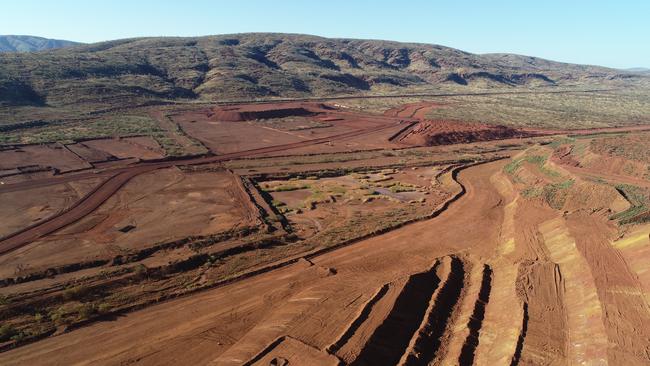
Cameron Stewart 8.46am: Trump to boost coronavirus testing
Donald Trump has released new national guidelines to boost coronavirus testing to answer growing criticism that not enough testing has been done to give confidence to Americans to return to work.
But the president has still left the responsibility of testing to state governments, describing the federal government’s role as “a supplier of last resort”.
“We are going with maximum testing,” Mr Trump said at the White House where he unveiled the guidelines. “We are going to be much higher than double on testing very soon.”
“We are confident that we have enough testing to begin the reopening process,” Mr Trump said, adding that the US had now boosted its testing to 200,000 people a day and would continue to boost it sharply.
“The US has conducted more than 5.4 million tests – more than twice as much as any other country,” he said, although the US still lags many other countries in resting on a per capita basis. The 5.4 million tests represents about 1.6 per cent of the population.
Follow all the latest updates at our coronavirus live blog
President @realDonaldTrump's plan for Opening Up America Again outlined a three-phased approach based on the advice of public health experts.
— The White House (@WhiteHouse) April 27, 2020
Today, we're laying out the blueprint for testing and rapid response programs called for in the plan.https://t.co/8JKY0040jJ
7.45am: Copper hits six-week high
Copper bounced to its highest in about six weeks as investors hoped that easing of lockdowns and factory restarts would revive metals demand hit by the coronavirus pandemic.
Industrial metals prices rose along with stock markets, which also took heart from further stimulus measures announced by Japan.
Benchmark three-month copper on the London Metal Exchange rose as much as 2.5 per cent to $US5,269 a tonne, its highest since March 17, before paring gains to $US5,199 by 1700 GMT, a rise of 1.2 per cent.
LME aluminium inventories keep piling up, rising to 1,336,775 tonnes, the highest since January 16 and up 38 per cent over the past six weeks, LME data showed.
LME aluminium shed 0.5 per cent to $US1,507.
Reuters
7.40am: ASX set for slightly higher open
The Australian stock market is tipped for a flat or slightly higher open despite an overnight surge on Wall Street fuelled by the potential easing of some coronavirus restrictions.
At 7am (AEST) the Australian SPI 200 futures contract was up 5.0 points, or 0.09 per cent, at 5,313.0 points, pointing to a subdued open for local stocks.
US indices gained more than 1.0 per cent as investors looked towards several US states that are relaxing shutdown restrictions put in place to curb the spread of the COVID-19 pandemic.
NAB’s poor first-half result may have blighted the financial sector on Monday but the S&P/ASX200 benchmark index still finished 78.8 points higher, or 1.5 per cent, at 5,321.4.
The All Ordinaries index rose 87.6 points, or 1.65 per cent, at 5,388.3. Oil prices have plunged again due to lack of available storage to deal with a coronavirus-induced collapse in demand.
One Australian dollar buys US64.65 cents at 7am (AEST), up from US64.60 cents at Monday’s close.
AAP
7.20am: Mesoblast shares down 20pc
US-traded shares in Australia’s Mesoblast dropped 20pc to $US12.43 after more than doubling Friday, as the company reported 83pc survival in ventilator-dependent COVID-19 patients with moderate/severe acute respiratory distress syndrome.
The patients were treated during March and April with two intravenous infusions of Mesoblast’s allogenic mesenchymal stem cell product candidate remestemcel-L within the first five days.
Volume for the stock was 3.1 million shares in US lunchtime trade, compared to its 65-day average volume of 720,000 shares. The stock hit a 52-week high of $US20.57 on Friday.
The company said 75pc of patients have successfully come off ventilator support at a median of 10 days. At this time, seven have been discharged from the hospital. Patients received a variety of experimental agents prior to remestemcel-L. All patients were treated under an emergency Investigational New Drug application or expanded access protocol at New York City’s Mount Sinai hospital.
The company said it intends to rapidly complete its phase 2/3 trial in COVID-19 ARDS patients to confirm that remestemcel-L improves survival in these critically ill patients.
Dow Jones Newswires
6.05am: Wall Street ends higher
US stocks rose, with investors betting that stimulus measures and the easing of coronavirus-lockdown measures around the world could help kickstart economic activity.
The Dow Jones Industrial Average gained 354 points, or 1.5 per cent, to 24129 as of the close of trade. The S&P 500 added 1.5 per cent and the Nasdaq Composite advanced 1.1 per cent.
Australian stocks surged 1.5 per cent on Monday and look set to open higher on Tuesday. At 6am (AEST) the SPI futures index was up 15 points, or 0.3 per cent.
In the US, some states allowed retailers, salons and other businesses to reopen over the weekend as new infections appeared to slow.
“We don’t yet know the full scale and the pace of lockdowns being eased, but it’s important for confidence,” said Edward Park, deputy chief investment officer at Brooks Macdonald. “Suggestions that factories will restart sooner rather than later suggests that the pressure on economic output in the data we’ve seen will be a shorter-lived phenomenon.”
Still, signs of the coronavirus pandemic’s financial toll continued to ripple across markets.
General Motors shares rose 1.9pc, erasing earlier declines, after the company said it was suspending its dividend and share repurchase program as part of an effort to conserve cash.
Apple fell 0.3pc following a report that it was pushing back a ramp-up in production of new iPhones by about a month. The pandemic has dented consumer demand for a variety of products, as well as disrupted supply chains across the world.
Later this week, investors say they will be closely focused on the outcome from the U.S. Federal Reserve and the European Central Bank’s meetings. Recent economic data and forecasts from many countries have been weak, prompting policy makers to take unprecedented steps and allocate huge sums to support businesses and individuals whose finances have taken a hit.
Elsewhere, European markets climbed as countries including Italy and Spain signalled that they may loosen restrictions in the coming weeks. The pan-continental Stoxx Europe 600 rose 1.8pc.
In Asia, Japan’s Nikkei 225 stock index ended the day up 2.7pc. The Bank of Japan scrapped its target for government-bond purchases and said it would nearly triple its holdings of corporate debt to aid fundraising by companies affected by the coronavirus pandemic.
Meanwhile, the Shanghai Composite closed 0.3pc higher after China’s statistics bureau released data showing that industrial companies’ profits in March were down 34.9pc from a year earlier, a slight improvement from the 38.3pc pace of decline in January-February. The country last month began reopening some industrial hubs after closing most factories and companies to curb the coronavirus’s spread.
Dow Jones Newswires
5.58am: Oil slides as glut spooks investors
Oil prices tumbled anew, falling near their lowest level since 1999 in the latest demonstration that traders are wary of holding crude with a global glut rapidly expanding.
The slide reversed a rebound from late last week, reflecting mounting scepticism that co-ordinated supply cuts by the Organisation of the Petroleum Exporting Countries and allies will prevent the world’s oil storage from filling to the brim. Many North American producers are also being forced to curb output and shut in productive wells, but analysts say the moves are too little, too late.
US crude futures for delivery in June slid 25pc to $US12.78 a barrel, dropping near a 21-year low from last week. The US price benchmark started the year above $US60.
Brent crude, the global gauge of prices, slid 6.8 per cent to $US19.99 a barrel.
Many investors are reluctant to hold oil-related investments after a futures contract for delivery next month last Monday tumbled below $0 a barrel, a first in oil-market history. Even though it recovered to expire in positive territory the following day, the crash illustrated the dangers of holding oil futures that expire soon.
When such contracts expire, they must either be sold or the holder must take delivery of a certain amount of oil by a date in the future. Traders say the dive below $0 was likely driven by investors unable to find available storage who were then forced to sell. The expiration of the made the June contract the earliest futures contract available to investors.
Traders said Monday’s selling showed investors fear a replay and now are trying to reduce their positions in near-dated oil futures.
Dow Jones
5.55am: Virus hits BHP mine
Peruvian copper mine Antamina, owned by global miners BHP and Glencore, has reported 210 positive cases of coronavirus.
The company said in a statement it discovered the cases while conducting 600 tests on its staff and contractors, 500 of which have been returned by the laboratory.
It said that 87 per cent of the positive cases were asymptomatic while those with signs of COVID-19 mostly had mild symptoms.
Antamina said two weeks ago it would halt all operations for at least two weeks to mitigate against the spread of the virus.
Reuters
5.50am: Tesla’s new feature
After testing on public roads, Tesla is rolling out a new feature of its partially automated driving system designed to spot stop signs and traffic signals.
The update of the electric car company’s cruise control and auto-steer systems is a step toward CEO Elon Musk’s pledge to convert cars to fully self-driving vehicles later this year.
But it also runs contrary to recommendations from the U.S. National Transportation Safety Board that include limiting where Tesla’s Autopilot driving system can operate because it has failed to spot and react to hazards in at least three fatal crashes.
AP
5.48am: Boeing sees slow airline rebound
Boeing’s head said that restoring the dividend could take three to five years as the company girds for a slow air travel recovery in the wake of the coronavirus crisis.
Chief Executive David Calhoun said it could take “years” to resume dividends after halting the payments in March, signalling that paying back debt and keeping up its manufacturing supply chain were bigger priorities for the foreseeable future.
Speaking at the company’s annual meeting, Calhoun offered a sober outlook on the near-term prospects for commercial air travel in the wake of a virus that is projected to cost the industry hundreds of billions of dollars in 2020 revenues.
Calhoun said it could take two to three years for commercial airline travel to return to the level prior to the coronavirus crisis.
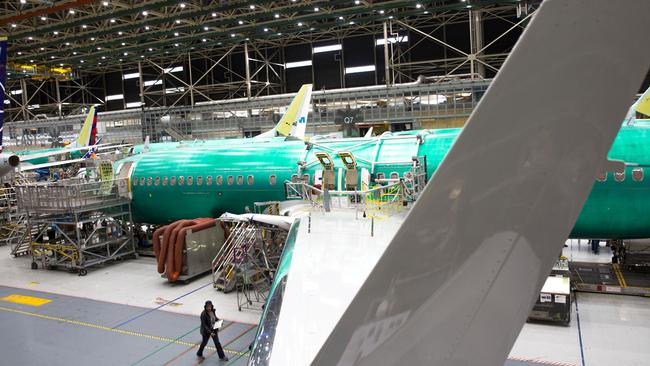
AFP
5.45am: Markets rise, oil tanks
Equity markets rallied as governments across the world started to ease coronavirus lockdown measures, while oil prices tumbled as a supply glut offset output cuts.
US markets followed Asia and Europe higher after virus figures from some of the worst-hit countries provided hope that the peak of the crisis may have passed.
Stocks kicked off the week “in optimistic fashion”, said Joshua Mahony, senior market analyst at IG trading group.
Ending lockdowns means one step towards the resumption of economic activity. Germany on Monday said it had seen the slowest pace of infections and deaths since March 29.
In Italy, wholesale stores and restaurants will be allowed to resume business on May 4, Spain on Sunday let children play outside and Swiss hairdressers, massage parlours, florists and garden centres are reopening.
Meanwhile, New York Governor Andrew Cuomo said that a first stage of a reopening would start on May 15 if hospitalisations decreased.
British Prime Minister Boris Johnson said Britain was beginning to “turn the tide” but it was too early to ease the lockdown.
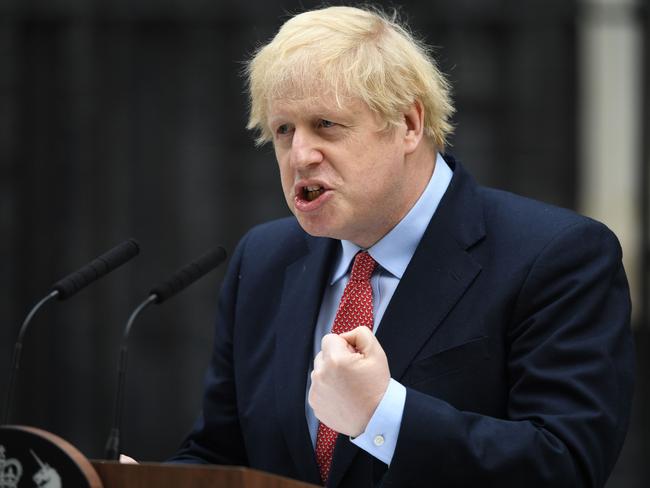
London closed up 1.3 per cent, Frankfurt gained 3.1 per cent and Paris ended 2.6 per cent higher.
Traders welcomed the overall improved picture, with most Asian markets kicking off the week with gains and Tokyo’s main stock market closing up 2.7 per cent.
On oil markets, WTI lost nearly 30 per cent, having already endured a hammering last week.
Worries about a lack of storage amid plunging demand for crude overshadowed signs that some countries — including Kuwait and Algeria — are starting to slash production in line with a deal hammered out this month.
Investors are meanwhile looking to meetings by two of the world’s most powerful central banks, the Fed and the ECB, later in the week for news on stimulus measures.
AFP
5.38am: GM suspends dividend
General Motors announced that it will suspend its dividend and halt share repurchases as it conserves cash amid a broad economic slowdown expected to weigh on auto purchases.
GM said it had also extended a $US3.6 billion bank credit facility through April 2022 to build more liquidity capacity.
“We continue to enhance our liquidity to help navigate the uncertainties in the global market created by this pandemic,” said GM Chief Financial Officer Dhivya Suryadevara.
“Fortifying our cash position and strengthening our balance sheet will position the company to create value for all our shareholders through this cycle.”
The biggest US car manufacturer still has set no time frame for resuming auto production after announcing on March 18 it was suspending North American operations to combat the spread of the coronavirus.
AFP
5.35am: Airbnb’s new cleaning protocols
Airbnb announced new protocols for cleaning and sanitising its listed properties in an effort to reassure travellers and revive bookings for the homesharing platform, which is reeling from the coronavirus pandemic.
The initiative set to launch in May calls for “enhanced procedures and guidance on how to clean every room in a home,” and a certification program to identify properties meeting the new standards.
Airbnb said it was establishing the new safety policy based on guidance from the US Centers for Disease Control and Prevention and other experts in the field, amid signs of an easing of antivirus restrictions in some countries.
AFP
5.32am: Scania restarts production
Truck maker Scania, part of Volkswagen’s Traton group, said it was tentatively resuming production a month after closing down due to the coronavirus pandemic.
After halting production at most of its facilities in March, Scania said it was gradually restarting production in Sweden, the Netherlands, Brazil and France.
Production in Sweden and the Netherlands started last week, and production in France and Brazil would resume this week.
However, the company stressed that this was a gradual opening, and all locations would operate at reduced capacity.
One factory in Sweden had only opened for two days of the week, and only worked at half capacity compared to normal operations.
AFP
5.30am: Deutsche profit takes hit
Deutsche Bank has reported that its net income fell to 66 million euros ($US72m) in the first quarter as the pandemic hurt its business.
The bank said it was letting its financial buffers fall so it can maintain lending to clients but said the easing was temporary and modest. The net profit fell from 201 million euros in the first quarter of last year, while revenue dropped to 6.4 billion euros from 6.35 billion euros.
It said its common equity tier 1 ratio, one measure of financial strength, fell to 12.8pc from 13.6pc at year end. But the bank said it would not restrict lending just to maintain its target for its capital cushion.
AP
5.25am: BP tweaks Alaska deal
British energy major BP said that crashing oil prices had prompted it to tweak the terms of a gigantic deal to sell off its Alaska operations.
Hilcorp Alaska had agreed in August 2019 to purchase the assets, including operations in the mammoth Prudhoe Bay oilfield, for $US5.6 billion in a move that will see BP exit the US state after a 60-year presence.
Crude futures have however plunged to record lows this month, with US oil futures sinking briefly into negative territory on the back of demand-destroying coronavirus and a vicious price war between Saudi and Russia.
The energy sector — whose profits and revenues are heavily linked to crude oil prices — has been ravaged as COVID-19 slams the brakes on economic activity.
AFP
5.20am: Thongs, yoga mats salve Adidas’ misery
Adidas reported Monday worldwide sales plummeting in January-March, but lively demand for its striped flip-flops as a low-effort shoe for around the house has offered a slap of relief.
Known as “Adilettes”, the German brand’s ultra-casual footwear are more usually seen around the pool or in gym locker rooms, or on the street by fashionistas.
But as coronavirus lockdowns slammed into effect around the world, demand for flip-flops surged by “triple-digit” percentages in April compared with the average in recent months, chief executive Kasper Rorsted said.
The leap is “probably because people find that this is a super product to wear at home,” Rorsted mused about the footwear, which starts from around 20 euros ($21.7).
Adidas also booked “record sales” of yoga mats during the first three months as practitioners look to stay limber under lockdown.
Around the world, the group’s online sales leapt 55 per cent in March, as stores in Europe and North America shut down just as Chinese branches reopened following a month of closure.
But across the first quarter, profits slumped 95 per cent, to 31 million euros, and Adidas was unable to offer financial forecasts for the full year.
